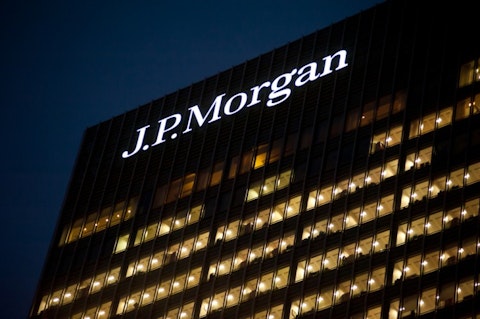The Standard and Poor’s 500 Index suffered one of its largest quarterly declines over the past few years in the third quarter, caused by concerns about China’s economic slowdown and uncertainties around the Federal Reserve’s decision to raise interest rates. In fact, the benchmark lost 6.94% during the third quarter, so it is no surprise that most hedge funds and other large money managers registered significant losses during the three month period as well. This article will be focused on the performance of Ric Dillon’s Diamond Hill Capital Management in the third quarter, and will discuss the investment firm’s most prominent stock picks. The firm’s 14 positions in companies with a market capitalization greater than $1 billion delivered a negative return of 7.88% during the three-month period, which indicates that Diamond Hill Capital’s stock picks underperformed the broader market. It should be noted that this is only an estimate of the returns of certain long positions of the fund and is not meant to estimate its actual returns, which could be substantially different. Let’s now take a look at some of Diamond Hill Capital’s stock picks and their performance during the third quarter.

pcruciatti / Shutterstock.com
Diamond Hill Capital Management is an investment management firm founded by Ric Dillon in 2000. The Ohio-based firm has $15.9 billion in assets under management as of September 30, and primarily invests in U.S equity, alternative long-short equity, and fixed income strategies. Diamond Hill follows an intrinsic value-based investment philosophy, and constantly seeks out discrepancies between the market price and intrinsic value of public companies. As stated by its 13F filing for the June quarter, Ric Dillon’s investment firm owns a public equity portfolio with a market value of $15.05 billion.
Follow Heather Brilliant's Diamond Hill Capital
Hedge funds have been underperforming the market for a very long time. However, this was mainly because of the huge fees that hedge funds charge as well as the poor performance of their short books. Hedge funds’ long positions actually performed better than the market. Small-cap stocks, activist targets, and spin-offs were among the bright spots in hedge funds’ portfolios. For instance, the 15 most popular small-cap stocks among hedge funds outperformed the market by more than 53 percentage points from the end of August 2012 (read the details here), returning 102%. This strategy also managed to beat the market by double digits annually in our back tests covering the 1999-2012 period.
Let’s kick off our discussion with Citigroup Inc. (NYSE:C), which represents Diamond Hill’s largest holding at the end of the second quarter. The Ohio-based firm increased its stake in Citigroup by nearly 299,000 shares during that three-month period, ending the quarter with 7.80 million shares valued at $430.83 million. The shares of Citigroup lost 10.12% during the third quarter, and seriously impacted the investment firm’s performance during the “bloody” quarter. However, the stock appears to be rebounding at the moment, thanks to the strong third quarter earnings report it released earlier this week. Citigroup Inc. (NYSE:C) reported net income of $4.3 billion on revenues of $18.7 billion, compared with net income of $2.8 billion on revenues of $19.7 billion reported a year ago. Boykin Curry’s Eagle Capital Management owns 24.37 million shares of Citigroup Inc. (NYSE:C) as of June 30.
Follow Citigroup Inc (NYSE:C)
Follow Citigroup Inc (NYSE:C)
Receive real-time insider trading and news alerts
Let’s now move on to Procter & Gamble Co (NYSE:PG), which saw its stock decline by 7.30% during the third quarter. Diamond Hill reported owning 4.48 million shares of the multinational consumer goods company, which were worth $350.14 million. It is true that Procter & Gamble Co (NYSE:PG) has had a rough year thus far, with its shares declining by more than 17% year-to-date, but the company has been working on a crucial product portfolio overhaul. P&G decided to focus on ten business categories that have been growing rapidly and had higher operating margins than the total margins of the company. This strategy might enable the company to achieve its much-needed turnaround. Warren Buffett’s Berkshire Hathaway is by far the largest shareholder of Procter & Gamble Co (NYSE:PG) among the investment firms tracked by Insider Monkey, with 52.79 million shares.
Follow Procter & Gamble Co (NYSE:PG)
Follow Procter & Gamble Co (NYSE:PG)
Receive real-time insider trading and news alerts
On the next page of the article you can dive into the discussion of the other three major positions of Diamond Hill.
JPMorgan Chase & Co. (NYSE:JPM) did not have a great third quarter in terms of stock performance either, with its stock losing 9.43%. Its 13F filing for the June quarter revealed that Diamond Hill had 5.06 million shares of JPMorgan in its portfolio at the end of the second quarter, which were valued at $342.85 million. Earlier this week, JPMorgan Chase & Co. (NYSE:JPM) disclosed its third quarter earnings report, posting net revenue of $23.54 billion, which was down by 6% year-over-year. However, its net income increased by 22% year-over-year to $6.8 billion. It is worth pointing out that the revenue was impacted by lower corporate and investment banking segment revenue and by lower mortgage banking revenue. Ken Fisher’s Fisher Asset Management is among the top stockholders of JPMorgan Chase & Co. (NYSE:JPM), with 13.74 million shares.
Follow Jpmorgan Chase & Co (NYSE:JPM)
Follow Jpmorgan Chase & Co (NYSE:JPM)
Receive real-time insider trading and news alerts
Let’s now turn our focus on Alphabet Inc. (NASDAQ:GOOGL), which has recently undergone a business structure overhaul. Diamond Hill owned 485,384 Class A shares of Alphabet at the end of the second quarter, which were worth $262.13 million on June 30. This marked an increase of roughly 68,000 shares from the position disclosed in its 13F for the first quarter. The Class A common stock of Alphabet Inc. (NASDAQ:GOOGL) returned 18.21% in the third quarter, which somewhat offset the negative performance of many of the other stocks included in the investment firm’s portfolio. It is believed that the new structure of Alphabet will unlock more shareholder value, as it is set to enhance transparency and give more room for its bountiful smaller businesses to develop at a higher-pace and develop their own identity (read more details here). Andreas Halvorsen’s Viking Global owns 2.74 million Class A shares and 1.15 million Class C shares of Alphabet Inc. (NASDAQ:GOOG) as of June 30.
Follow Alphabet Inc. (NASDAQ:GOOGL)
Follow Alphabet Inc. (NASDAQ:GOOGL)
Receive real-time insider trading and news alerts
Last but not least, Ric Dillon’s Diamond Hill owns nearly 1.35 million shares of International Business Machines Corp. (NYSE:IBM) as of June 30, which were valued at $218.98 million. The stock lost 10.14% during the latest quarter, and is 6% in the red year-to-date. International Business Machines Corp. (NYSE:IBM) is set to disclose its third quarter earnings report after the market close on Monday, and analysts anticipate earnings per share of $3.30 on revenue of $19.6 billion. Let us remind you that the company posted EPS of $3.68 on revenue of $22.4 billion for the same quarter last year. Philippe Laffont’s Coatue Management added a 440,097-share position in International Business Machines Corp. (NYSE:IBM) to its portfolio during the second quarter.
Follow International Business Machines Corp (NYSE:IBM)
Follow International Business Machines Corp (NYSE:IBM)
Receive real-time insider trading and news alerts
Disclosure: None





